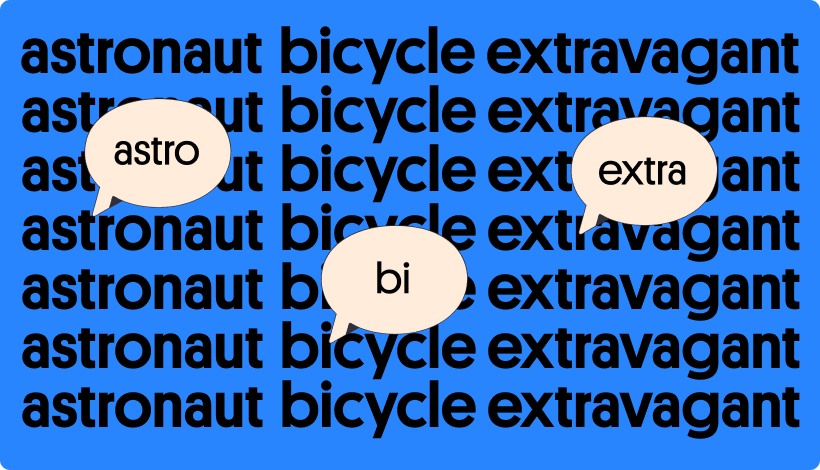" in the other life I might have had had something to do..."Why two "hads"
This is from Shirley MacLaine Academy Awards acceptance speech in 1984. If you are using a modal auxiliary verb (might, may, could, etc) to express something in the past, doesn't it has to be in the format have + past participle? Should it be "I might have had something to do with this." instead of "I might have had had something to do with this."? Thanks a lot for your help.
9 Answers
9 from verified tutorsHi Michael The phrase “Had had” is the past tense of the phrase “have had” One of the meanings is to be unable to tolerate someone or something any longer. Examples: I had had it with him I might have had had it with him, don’t judge me.
OTHERWISE I might have had something to do with this (grammatical) I might have had had something to do with this (possible typo error)
Best Regards

Find out your English level.
Take this 5-min test to see how close you are to achieving your language learning goals.
Hello, We use had had in the past perfect when the main verb is also “have”:
Last weekend I just wanted to relax because I had had a busy week. The director told me he had had a meeting with the president. We had had some trouble with our washing machine, so we called a repairman. Regards
MY PERSONAL EXPERIENCE ON LOST CRYPTO RECOVERY! I read so many stories about bitcoin loss to scams. I will like to start by saying the agencies responsible for bitcoin security has really done nothing to help locate stolen or lost coins. In my situation my MacBook was hacked by someone that had access to my emails, i immediately contacted blockchain and they only wasted my time, after which i worked towards getting help else where, i was referred to consult a bitcoin expert who helped track and retrieved my 3.3 btc, for an agreed fee. I was more than grateful and willing to pay more after the job was done. Thankful i didn't fall victim and would like to recommend ( MORRIS GRAY 830 @ G maiL . COM )...
A MUST READ FOR ALL CRYPTO SCAMS VICTIM Coinfx market is a big scam broker, i paid a huge amount of $70,000, they persuaded me, into putting more of my hard earned money with all hope to get profits in return, they won’t allow me to make a withdrawal of my investment, all because all they wanted is to steal my money, i got advised to file a refund case against them, which to my greatest surprise i was able to withdraw my money, i contacted a recovery expert { MORRISGRAY830@GMAIL.COM } and his team of recovery experts, they where able to assist me with the withdrawal of my money, and restore my funds, they are very responsive, and you can reach out to him for help also, i know am not the only one who has fallen victim, people out there might also need this information!
Hey Michael, you're absolutely right. "Might have had had" is ungrammatical and should instead be simply "might have had".
That being said, I've checked out this speech from Shirley MacLaine, and it goes a bit differently:
"Probably everybody I've ever met in my entire life, and in the other life I might've had, had something to do with this."
I've added commas where needed, so now it should be clear why she said "might have had had". There are two verb phrases here: "might have had" and "had".
"Probably everybody I've ever met in my entire life HAD something to do with this"
plus
"and everybody in the other life I MIGHT'VE HAD".
The second "had" has nothing to do with the first one. If it helps, the sentence can be rephrased such that the two "had"s are farther apart:
Probably everybody I've ever met in the other life I might've had and in my entire life had something to do with this.
Hopefully this clears it up. Great question, by the way!
Hi Aleksandar, thank you so much for making it better understood. You are a great teacher!
your explanation is great , and it shows the importance of the correct use of punctuation
MY PERSONAL EXPERIENCE ON LOST CRYPTO RECOVERY! I read so many stories about bitcoin loss to scams. I will like to start by saying the agencies responsible for bitcoin security has really done nothing to help locate stolen or lost coins. In my situation my MacBook was hacked by someone that had access to my emails, i immediately contacted blockchain and they only wasted my time, after which i worked towards getting help else where, i was referred to consult a bitcoin expert who helped track and retrieved my 3.3 btc, for an agreed fee. I was more than grateful and willing to pay more after the job was done. Thankful i didn't fall victim and would like to recommend ( MORRIS GRAY 830 @ G maiL . COM )....
TL:DR
"Had had" is the past perfect tense form of "have had"
The main verb "have" becomes "had"
It does make sense, if you add the correct punctuation marks.
Hello
The use of two "hads" in the sentence is a grammatical error. The sentence should read, "In the other life I might have had something to do..."
Hello Michael.
“Had had” is the past perfect tense of “have.” You use the past perfect tense when you need to indicate that something occurred before another previous event.
kind regards
It's showing the past tense within the sentence structure
When using modal auxiliary verbs such as "might," "may," and "could" to express possibility or uncertainty in the past, the correct format is "have + past participle." For example, "I might have gone to the store yesterday." However, in the case of Shirley MacLaine's speech, she added an extra "had" to emphasize that she was referring to a hypothetical situation in another life. So, the sentence "I might have had had something to do with this" means "In another life, I might have had something to do with this." It is not grammatically incorrect, but it is a more complex sentence structure and might not be commonly used in everyday conversation.
Still need help?
Find an online tutor for 1-on-1 lessons and master the knowledge you need! Prices from just $5 per hour.
You might be interested in



English community experts
Click on a tutor to learn more about them

James while John had had had had had had had had had had had a better effect on the teacher
Hello, Might have had is the correct way of using it. Might have had had is wrong.
You can use the word “had” twice in succession in a sentence when you are using the past perfect tense in talking about the past, and you want to refer back to an earlier past time.
Hi Michael, thanks for your question. It’s very difficult to understand this fragment when the full sentence isn’t here, so I looked up her speech to find the rest of the sentence: “I'm not going to thank everybody I've ever met in my entire life -- although, with the way my mind has been going lately probably everybody I've ever met in my entire life and in the other life I might have had had something to do with this.” The grammar is correct here, but it is confusing as the present perfect tense is placed next to the past tense of the verb “have”. The sentence is also confusing as it describes a hypothetical situation of the speaker having lived a different life, and furthermore imagining that people from both her other life and the one she has actually lived have helped her win this award. With the excitement of having won an academy award she is gushing and doesn’t know how to fit in all the thank yous she wants to for everyone who’s helped her. We can think about “the other life I might have had” and “had something to do with this” as different fragments. In “in the other life I might have had”, “have had” is in the present perfect tense. The word “might” indicates possibility. So the speaker is discussing a hypothetical situation in which she has lived a different life. If she had lived this other life then this life would have been lived up until today. In the fragment “had something to do with this” the speaker is imagining that all the people from her real life and from the other life she could have had all contributed to her winning the award.
I agree with Bronwyn in regards to the explanation of two different phrases: “the other life I might have had” and “had something to do with this” but for the part about the Present Perfect Tense. After the modal verb 'might' we use infinitive, therefore 'have had' is the Perfect Infinitive, not the Present Perfect. We can check this out by using the third person singular, e.g. 'She might have had enough', notice that in the Present Perfect after she we should use 'has' instead of 'have' but we can't make this change after the modal verbs: 'Linda can go now', not 'Linda can goes now' or 'Linda could have gone now', not 'Linda could has gone now'. It is a minor detail but we should name things the right way to avoid confusion. Placing a comma between two "hads" clarifies the meaning of the sentence. Hope this helps. Слава Україні! [Slava Ukrayini] - Glory to Ukraine!
A MUST READ FOR ALL CRYPTO SCAMS VICTIM Coinfx market is a big scam broker, i paid a huge amount of $70,000, they persuaded me, into putting more of my hard earned money with all hope to get profits in return, they won’t allow me to make a withdrawal of my investment, all because all they wanted is to steal my money, i got advised to file a refund case against them, which to my greatest surprise i was able to withdraw my money, i contacted a recovery expert { MORRISGRAY830@GMAIL.COM } and his team of recovery experts, they where able to assist me with the withdrawal of my money, and restore my funds, they are very responsive, and you can reach out to him for help also, i know am not the only one who has fallen victim, people out there might also need this information!!!